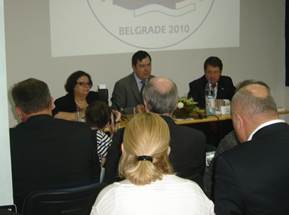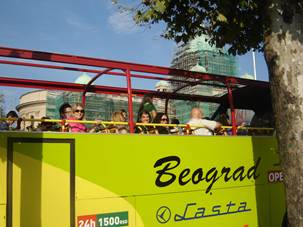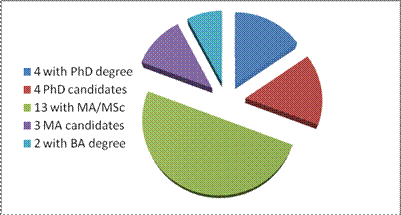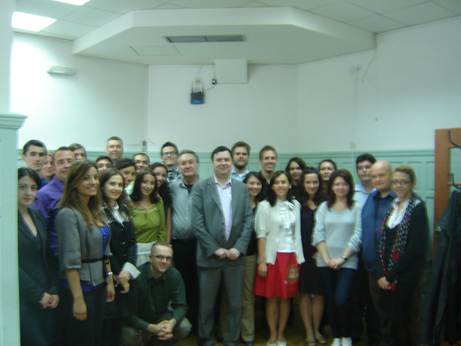AnSeS
Report on the Thirteenth South-East European
Summer School for Democracy,
Belgrade, 5th September – 11th September 2010
CONTENTS:
A. Organisation of the Summer School, resource persons and lectures
B. Evaluation
C. List of participants
A. Organisation of the Summer School, Resource Persons and Lectures
The Thirteenth South-East European Summer School for Democracy, entitled Enlargement Fatigue and EU Prospects of the Countries of the Western Balkans was held in Belgrade, Serbia, from 5th September till 11th September 2010.
Sponsors:
The Anglo-Serbian Society would like to thank the following sponsors of the South-East European Summer School for Democracy 2010:
1.The British Embassy, Belgrade
2. The Hellenic Observatory/LSEE of the London School of Economics
3. The Balkan Trust for Democracy, and
4. Agency for Co-operation with NGOs and European Harmonisation of the City of Belgrade
Lecturers and participants:
The School gathered prominent political scientists from Britain, Hungary, and Serbia. Four lecturers came from Britain: Prof. Christopher Coker of the London School of Economics, Prof. Margaret Blunden, professor emeritus at the University of Westminster, Dr. Spyros Economides from the London School of Economics, and Dr. Will Bartlett from LSEE/LSE.
The School had special session on Tuesday, September 7, 2010 on EU prospects of Serbia and the Western Balkans that was opened by the addresses of HE Stephen Wordsworth, Ambassador of the UK to Serbia and Ms. Sonja Licht, President of the Belgrade Fund for Political Excellence. The special session was covered by all major digital and print media in Serbia and was widely covered in leading quality dailies.
Among twenty-six participants 10 were from Serbia and 14 from the region of SEE (four from Romania, three from /FYR/ Macedonia two from the Hellenic Republic and Albania, one from Bulgaria, Croatia and Slovenia), 1 from Western Europe (France/Germany), and one participant from Caucasus (Georgia).
Selection of participants
The Summer School was primarily advertised through the yahoo group Balkan Academic News but also was advertised by relevant regional internet sites. Info on the Summer School was also available through several facebook profiles and blogs.
As a result of the advertising the Anglo-Serbian Society received around 90 applications from South-East Europe and Serbia. Especially numerous were applications outside of Serbia – 72 of them.
Selected participants included 4 persons with PhD degrees, 10 had MA degrees, 5 were MA students, and 7 had a BA degree. Eight of them had teaching or research positions and others had background in civil society, media and governmental sector.
The list of lecturers and participants of the School is available in the brochure that has been published by the School and at the web-site of the Anglo-Serbian Society: www.ays.org.yu. It is also enclosed in this report.
School Organisers and Staff
The School was organised by the Anglo-Serbian Society, Belgrade, and the Hellenic Observatory and LSEE of the London School of Economics and Political Science.
In academic terms the School was managed by its Co-Directors: Prof. Vukasin Pavlovic, Vice-Dean of the Faculty of Political Science, Belgrade and Dr. Spyros Econmides of the Hellenic Observatory/LSE. In organisational terms the School was managed by Dr. Slobodan Markovich, Executive Director of the School. The Secretary of the School was Ms. Milica Bogdanovic, Programme Co-ordinator at the Anglo-Serbian Society, and Programme Assistant was Ms. Sladjana Gligoric.
The School as a Regional (South-East European) Project
Since its foundation in 1998 the School has persistently endeavoured to gather prominent young specialists from the fields of Political Science, European Integration, Law and Humanities as well as activists in the field of civil society from the region of South-East Europe. Additionally several summer schools were attended by persons from governmental sector such as persons from MoD and MFA. Even under very difficult political circumstances prior to the downfall of the regime of Slobodan Milosevic (in 1998, 1999 and 2000), the School was able to gather young specialists from the region.
Each summer school for democracy gathered between 25 and 30 participants (up to 15 from Serbia and Montenegro, and the equal number from the region of South-East Europe). This means that during the previous eleven years approx. 160 young scholars and activists from the region and the equal number from Serbia and Montenegro participated in the project (altogether a. 320 alumni).
In this way the School has been able to create a network of young specialists dealing with the problems of democratisation of the region and to establish mutual links between them. A practical result of the School is that there are many web-groups created by School’s alumni enabling constant contact between scholars from the region. Alumni stay in touch and continue to co-operate and invite other alumni to the conferences that they organise.
An important aspect of the School is that it serves as a forum where young scholars from the region are able to exchange their views and learn to view social problems through regional perspectives. In this way the School offers its contribution to the democratisation of the region and to overcoming national preconceptions and stereotypes. For this sole purpose afternoon workshops were introduced in 2003. and special sessions aimed at overcoming national stereotypes were added in 2007.
Participants from the previous summer schools (since 2005) organised various yahoo groups and participants from the Summer School 2010 have organised their Facebook Profile.
School's Programme
The School lasted five days. Each of the five working days had two morning lectures, one afternoon lecture, and an additional session dedicated to Afternoon Discussions. The programme also included a visit to the Serbian European Integration Office and special book-launch with a lecture by Prof. Christopher Coker.
 |
Photo 1 Opening of the Summer School: Ms. Sonja Licht, Dr. Slobodan G. Markovich, HE Stephen Wordsworth |
Resource Persons
- Dr. William Bartlett, LSEE, European Institute, LSE
- Prof. Margaret Blunden, Formerly Provost at the University of Westminster
- Prof. Christopher Coker, London School of Economics and Political Science
- Dr. Milica Delevic, Director of the Serbian Integration Office
- Dr. Spyros Economides, Hellenic Observatory, LSE
- Dr. Slobodan G. Markovich, Institute for European Studies and the University of Belgrade
- Mr. Vladimir Medjak, Assistant Director, Serbian European Integration Office
- Prof. Vukasin Pavlovic, Vice-Dean at the Faculty of Political Science, Belgrade
- Ivan Vejvoda, Executive Director, Balkan Trust for Democracy
- Dr. Eric Beckett Weaver, editor of the South Slav Journal
Special Events
Visit to the Serbian European Integration Office
On Monday, September 6, 2010 participants had an occasion to visit the Serbian European Integration Office where its director Dr. Milica Delevic delivered a lecture “Impact of Enlargement Fatigue on EU Prospects of Serbia and WB.” In Q&A session Dr. Delevic discussed with participants both theoretical aspects of the question and current trends.
Opening of the Summer School for Media
Due to technical difficulties the Summer School had its opening session on Tuesday, September 7. H.E. Stephen Wordsworth, UK Ambassador to Serbia, and Ms. Sonja Licht, President of the Foreign Policy Council of the Ministry of Foreign Affairs of Serbia, took part in the session and they discussed EU prospects of Serbia. The session was organised on the eve of Serbia’s talks with the EU regarding UN resolution on Kosovo following the legal opinion of the ICJ. For this reason all media attention was focused on this question. At the end of the session participants had chance to put questions to panellist and also Serbian media. The opening session was covered by Serbian digital and print media.
Sightseeing of Belgrade in Open Bus and by river cruise
On Thursday, September 9, Thanks to Belgrade Agency for Co-operation with NGOs participants had a chance to have sightseeing tour of Belgrade by Open Bus followed by a sightseeing of Belgrade by river boat.
 |
Photo 2 Participants during guided bus tour through Belgrade |
Visit of British lecturers to the Palace Complex in Belgrade
On September 9, British lecturers at the summer school had a chance to have memorable guided visit of the Palace Complex in Belgrade thanks to the kindness of HRH Prince Alexander of Yugoslavia.
Book-launch and lecture by Prof. Christopher Coker
The Summer School officially ended on Friday September 10 with the ceremony of awarding certificates. After the ceremony participants had a chance to attend a book-launch co-organised by the Zavod – Serbian Textbook Company and the Belgrade Fund for Political Excellence. At the book-launch introductory remarks were given by Ms. Sonja Licht and Prof. Slobodan G. Markovich and Prof. Christopher Coker then delivered a lecture entitled Whither the West? The lecture was followed by a session for question and answers and a cocktail. The lecture was organised on the occasion of the publication of the Serbian translation of The Future of War by Zavod – the Serbian Text Company. This title is one of the most popular books by Prof. Christopher Coker.
The lecture was attended by almost 150 persons including five ambassadors accredited in Serbia, by representatives of international organisations in Serbia, by well-known MPs, university professors and other prominent guests.
Media Coverage
The information on the opening of the Summer School was transmitted by State news agency Tanjug and information appeared in Belgrade tabloid dailies (Kurir and 24 casa), it was broadcasted on International Radio Serbia and Wikinews (Вики вести) in Serbian had an entry on it. The Belgrade Agency for Co-operation with NGOs sent information on it through its mailing list that includes all major NGOs in Serbia and the web-portal of the City of Belgrade also had information on it (www.beograd.rs).
The opening of the School was covered by news agencies Beta and Tanjug, by the daily Pres,by the daily survey of the Ministry of Foreign Affairs of Serbia, and by leading digital media including B92 and Voice of America in Serbian. Most of dailies had an article on it, although some did not mention the summer school but only quoted either Ms. Licht or Ambassador Wordsworth. Overall the official opening was well covered.
Book-launch and lecture by Prof. Christopher Coker were also covered and Prof. Coker also gave an interview to the leading quality daily Politika.
The opening of the School was also covered by fortnightly Bazar which also had several photos from the opening and a two-page interview with Prof. Margaret Blunden (Politika Bazar, September 17, 2010, pp. 5, 26-27).
B. Evaluation 2010
All 26 participants filled in questionnaires and evaluated all the lecturers and other elements on September 10, 2010. Lecturers were evaluated by using five criteria: 1. Preparedness, 2. Clarity, 3. Inter-Activity, 4. Interest, 5. General Impression. Marks were between 1 (the lowest mark), and 5 (the highest mark). Written evaluation was followed by a session of oral evaluation where each participant had an opportunity to assess the School.
Participants in 2010 have had rather solid educational backgrounds: four have been with PhD degrees, four PhD candidates, 13 with MA degrees, 3 have been MA candidates and 2 have been with BA degrees.

In terms of gender composition the Summer School had the following composition: 16 participants were females (61.5%) and 10 were males (38.5%).
The results of evaluation by lecturers using five different criteria (general impression, preparedness, clarity, inter-activity and interest) are given below:
|
|
||||||||||||||||||||||||||||||||||||||||||||||||||||||||||||||||||||||||||||||||||||||||||||||||||
The participants also evaluated afternoon discussions where participants presented problems of global crisis in political in economic terms in their native countries. However, afternoon discussions proved to be the least successful part this year.
Afternoon workshops |
||
|
2010 |
2009 |
Preparedness |
4,40 |
3.96 |
Usefulness |
4,52 |
3.57 |
General Impression |
4,56 |
3.87 |
Comparison of the average marks for the last six summer schools demonstrates that the Summer School 2010 has maintained the high level that was achieved during the previous summer schools and has improved it further. Out of five indicators Summer School 2010 has the highest score in the period 2005-2010 in three categories (preparedness, inter-active approach and interest) and the second best in one category (clarity). Therefore it can be considered as the best evaluated summer school in terms of lecturers for the period 2005-2010.
AVERAGE FOR ALL LECTURERS |
||||||
|
Belgrade |
Belgrade |
Belgrade |
Belgrade |
Belgrade |
Budva |
|
||||||
Preparedness |
4,64 |
4.54 |
4.54 |
4.51 |
4.41 |
4.53 |
Clarity |
4,47 |
4.42 |
4.50 |
4.45 |
4.26 |
4.31 |
Interactive Approach |
4,32 |
4.22 |
4.24 |
4.18 |
4.03 |
3.97 |
Interest |
4,47 |
4.39 |
4.40 |
4.40 |
4.20 |
4.20 |
General Impression |
4,40 |
4.53 |
4.44 |
4.34 |
4.20 |
4.25 |
Organisation of the School has received slightly lower average mainly due to insufficient amount of e-mail communication with participants before the beginning of the School but still it received a very good average.
Food has been evaluated with usual average. Accommodation at Hotel Majestic got quite less favourable score (4.01) than in the previous year. Finally facilities at Leonardo Centre also got favourable evaluation.
|
Belgrade |
Belgrade |
Belgrade |
Belgrade |
Belgrade |
Budva |
Organisation |
4.23 |
4.6 |
4.69 |
4.34 |
4.52 |
4.76 |
Accommodation |
4.01 |
4.45 |
4.2 |
4.80 |
4.44 |
2.67 |
Food |
3.70 |
3.95 |
3.35 |
3.75 |
4.04 |
4.43 |
Facilities |
4.59 |
4.69 |
4.56 |
4.58 |
4.35 |
n/a |
Another question was asked on how much the School contributed to improving regional contacts. In this respect participants demonstrated exceptionally high satisfaction by giving an average mark of 4,70 in comparison with 4.41 in 2009.
|
Belgrade |
Belgrade |
Belgrade |
Regional contacts |
4.70 |
4.41 |
4.52 |
All participants were asked on whether they would recommend the school to other potential participants. Five replies were offered:
- Would highly recommend
- Would recommend
- I am not sure
- Would not recommend
- Would not recommend at all
Majority of participants 76% noted that they would highly recommend the School, while 24% said they would recommend the School. Not a single respondent replied they he/she was not sure or would not recommend the School. This is a very good result and the second best in School’s history.
|
SEESSD 2010 |
SEESSD |
SSESSD 2008 |
ISSD |
ISSD |
ISSD 2005 |
|
||||||
Would highly recommend |
76% |
73% |
69.6% |
57,1% |
70,00% |
90.5% |
Would recommend |
24% |
27% |
30.4% |
42,9% |
30.00% |
9.5% |
I am not sure |
0% |
0% |
0% |
0% |
0% |
0% |
Would not recommend |
0% |
0% |
0% |
0% |
0% |
0% |
Would not recommend at all |
0% |
0% |
0% |
0% |
0% |
0% |
In order to improve advertisement of the School the participants were asked to respond on how they found out about the School.
Four answers were offered:
- Through alumni of the School
- Through one of the mailing lists
- Through one of the organizers
- Through web-site of the Anglo-Serbian Society
More than one half of participants (54%) found out about the School from mailing lists in particular “Balkan Academic News” (average for the last seven school is 42,5%). One fifth (20%) found out about it from the organisers, and 10% through alumni. The remaining 16% found out from e-mails of their friends or from specialised web-sites, in particular www.beostud.com
|
SEESSD |
SEESSD |
SEESSD |
ISSD 2007 |
ISSD 2006 |
ISSD 2005 |
ISSD 2004 |
|
|||||||
Mailing lists |
54% |
35% |
16% |
40% |
42.9% |
60.0% |
50% |
Alumni |
10% |
31% |
44% |
6,7% |
14.3% |
20.0% |
45% |
Organisers |
20% |
12% |
28% |
40% |
32.1% |
10,0% |
5% |
Lecturers |
0% |
12% |
0% |
n/a |
n/a |
n/a |
n/a |
In other way |
16% |
12% |
12% |
13,3% |
10.7% |
10,0% |
0% |
CONCLUSIONS
Evaluation of the Thirteenth South-East European Summer School for Democracy 2010 demonstrates that the participants were quite satisfied with the quality of the School and its lecturers. The organisation has also received very high average mark and the readiness to recommend the School is rather high. Accommodation was assessed with high marks while food got good marks.
Oral evaluation indicated that participants were very satisfied about the School and compared it very favourably with other similar experiences emphasising knowledge that have obtained. What was especially appreciated by participants was the quality of lectures. Oral evaluation demonstrated that participants evaluated very highly the possibility of having regional contacts and that the summer school positively contributed to their better understanding of the region and overcoming of stereotypes.
Some participants thought that the programme was demanding but many said that they would appreciate even more activities. Several participants suggested that presentations by participants should have more space at the summer school and perhaps should be in morning rather than in afternoon sessions.
Participants from other countries than Serbia and outside of Belgrade liked the fact that the School was held in Belgrade while participants from Belgrade preferred some other location in Serbia. Some participants felt that more frequent e-mail communication in the period before the School was needed and also they proposed that introductory sessions should be organised on arrival day for those coming from abroad.
Overall the Summer School 2010 received rather good evaluation by participants.
C. LIST OF PARTIPANTS 2010
Name and Family Name |
Country |
Degree |
|||
Christos |
Aivaliotis |
Hellenic Rep. |
MA, Coll.Europe |
||
Rok |
Avbar |
Slovenia |
PhD c., ULj |
||
Aleksandra |
Bocse |
Romania |
Mphil c. Cantab, BA in PS, Buch |
||
Natia |
Ejoshvili |
Georgia |
MA, Bologna: MA Amsterdam |
||
Dr. Ljubica |
Djabirova Pokrass |
(FYR) Macedonia |
PhD, Amsterdam |
||
Madalina |
Dobrescu |
Romania |
PhD c. LSE, MA in IP, U. Manchester |
||
Enis |
Fita |
Albania |
MA, Nantes; PhD c. In ES, Tirana |
||
Adrian-Lucian |
Kanovici |
Romania |
PhD c. Buch, MA in IR, Buch |
||
Konstantina |
Karydi |
Hellenic Rep. |
MSc, UCL; PhD c. Athens |
||
Jelena |
Mihajlov |
Serbia |
MA in CS, UB |
||
Arnaud |
Kurze |
France/Germany |
PhD c George Mason, VA |
||
Marko |
Milenkovic |
Serbia |
PhD c. UB, LLM Cantab |
||
Jan |
Litavski |
Serbia |
MA c. in IR |
||
Georgi |
Mandichev |
Bulgaria |
MA is Soc., CEU |
||
Aleksandra |
Nastase |
Romania |
MA in IR and SS, Buch. |
||
Ana |
Nikolic |
Serbia |
MA c. Iin ES, U.NS |
||
Xhesi |
Mane |
Albania |
MA, Trento |
||
Dr. Goran |
Nikolic |
Serbia |
PhD in Econ. |
||
Aleksandra |
Obradovic |
Serbia |
BA in PS, BU |
||
Mariana |
Opashinova |
(FYR) Macedonia |
MA PIA, Pittsburg |
||
Ivana |
Ostojic |
Serbia |
MA in EISS, Geneva |
||
Irena |
Peresa |
Croatia |
MA in Law, U. of Zagreb |
||
Sofija |
Radovic |
Serbia |
BA in PS, BU |
||
Bojana |
Sarenac |
Serbia |
LLBc. LSE |
||
Anastas |
Vangeli |
(FYR) Macedonia |
MA in NS, CEU |
||
Ivana |
Zaric |
Serbia |
MA in PS, UB; PhDc. In PS, UB |
||
List of abbreviations: ES - European Studies, PS - Political Sicence, c. – candidate, IR - International Relations, SOC. - Sociology, U. - University, BU Belgrade University, CEU – Central European University
 |
Photo 3 Participants at summer school 2010 |
| Belgrade, November 5, 2010 |
Prof. Slobodan G. Markovich, Secretary-General of the Anglo-Serbian Society |
